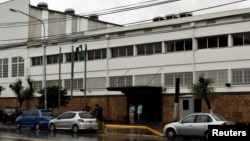Roberto Maceri is investing in machinery at his plastics plants ahead of Argentina's presidential election, betting on a stronger domestic economy and a more competitive exchange rate that may bring foreign markets back into play.
Operations at Argentine companies like his have been hampered in recent years as the outgoing left-wing government restricted imports, raised the tax burden on businesses and the middle class, and maintained the peso artificially strong.
Argentina's steady decline in competitiveness with neighboring economies hammered Maceri's exports to Uruguay, Colombia and even the United States in the past three years.
But with pro-business opposition challenger Mauricio Macri the favorite to win Sunday's presidential election run-off, Maceri is positioning himself for an economic rebound.
Even if the ruling party's Daniel Scioli stages a late come-back, Maceri still expects a more favorable business environment because Scioli is closer to the political center than President Cristina Fernandez.
"We have invested in machinery and we are waiting for the next productive cycle with a lot of optimism," said Maceri, who produces a range of plastic products from packaging and office supplies to fridge interiors and bathtubs.
He sustained output in the last few years by creating new product lines for the domestic market, which has been propped up by government incentives to encourage consumer spending.
Maceri's new investments total more than $1 million, the first time in nearly a decade that he is spending heavily to expand production capacity.
"We'll keep a close eye on whether we can export again," he said.
Many investors are more circumspect, preferring to sit tight ahead of the election. Even state-controlled energy firm YPF this month declined to give details on next year's budget, saying it will depend on the election winner's economic policies.
Fernandez introduced a raft of currency and trade controls to protect dwindling foreign reserves and stave off having to settle a legal dispute with creditors over defaulted debt. Hard currency stocks languish at a nine-year low.
Argentina is now ranked 121 out of 189 countries in the World Bank's Ease of Doing Business index, lying well behind neighboring Chile on 48, Uruguay on 92 and Brazil on 116.
Both Scioli and Macri would seek a debt deal with creditors to regain access to global debt markets but have locked horns on the pace and depth of reforms to lift capital controls, with Macri seeking much swifter changes to open up the economy.
Latino TCA, which supplies utility firms with optic cables and other equipment, has cut its workforce as the central bank tightens access to dollars, making it almost impossible to import goods. With no stock to sell, it is simply focused on keeping its brand alive.
The company's general manager Andrea Baena says Latino TCA may just break even this year. After that though, she says it is poised to benefit from a backlog of investment in utilities if the next president lifts a freeze on tariffs.
Even so, with inflation in double-digits and a widening fiscal deficit, there are no quick fixes for Latin America's No. 3 economy.
"It won't be easy, there is no magical solution," said Baena. "We are waiting to see what happens."
Defusing the Bomb
Foreign investors are watching closely.
"If ever there was a country in emerging or frontier markets that had the simplest route to a significant increase in economic output per capita, it is Argentina," said Denise Prime, emerging market investment manager at GAM.
Prime hopes for a Macri win but said even a slight shift toward more orthodox policies under Scioli would bolster investor confidence.
GAM has been a buyer of American Depositary Receipts in Pampa Energia in anticipation that a Macri win would see domestic electricity costs increase.
A key cause for uncertainty is the widespread expectation of a devaluation, regardless who wins on Sunday, to correct the inflated rate of the peso currency. One dollar buys just 9.65 pesos at the official rate but 15.41 on the black market.
Scioli has campaigned against a devaluation, saying it would hurt Argentines' purchasing power, but economists say it is inevitable as the central bank lacks enough dollars to keep the peso at the current rate.
"There will have to be an adjustment in the exchange rate," said Federico Semeniuk, a financial expert at Ecolatina consultancy. "We reckon it will weaken between 30 and 50 percent in 2016."
Semeniuk said a surge in demand for peso futures and local assets linked to hard currencies like dollar-linked bonds was due to businesses, institutional investors and savers seeking protection from a sharp fall in the peso.
Baena says Latino TCA needs immediate access to its cash in case an import authorization comes through but has it stashed in fixed deposits to shield it from inflation that economists estimate is running at around 25 percent.
Both Maceri and Baena are aware things will likely get worse before they get better. The next government will struggle to devalue and correct the fiscal deficit without damaging consumption in the short-term.
"They have made a very fragile mechanism like a bomb, and you have to disarm the bomb," said Baena. "Next year will be very tough, no matter who wins."





